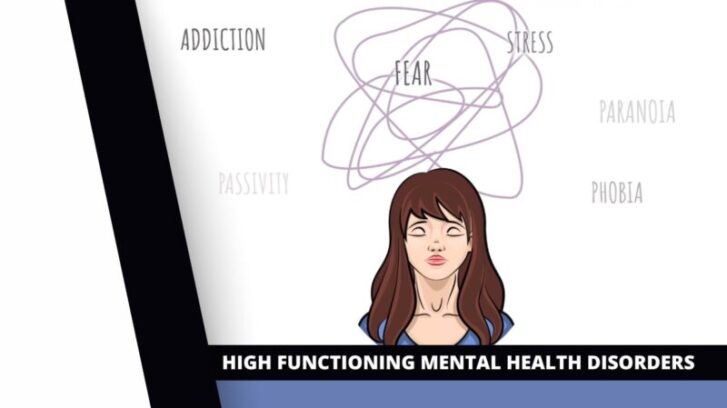These disorders present a paradoxical juxtaposition in mental health. In a society that often associates mental disorders with visible distress or dysfunction, individuals with high-functioning mental health disorders defy these expectations. They often excel in their careers, academics, or personal endeavors, seemingly untouched by the mental health challenges they are contending with. This impressive performance, however, belies a much more turbulent internal reality.
The concept of ‘high functioning’ in mental health disorders illuminates how some people manage to maintain their daily routines and meet societal expectations despite dealing with persistent psychological distress. This level of functionality can, in many cases, be a double-edged sword.
On one side, the ability to function can be a lifeline that preserves self-esteem and provides a sense of normalcy. On the other side, it can lead to the discounting of their struggle, making it easy for their conditions to remain unrecognized or misunderstood.
Understanding high-functioning mental health disorders is thus a vital endeavor. It is crucial in broadening our view of mental health to include those who may not fit traditional expectations. Recognizing these disorders is the first step towards addressing them, fostering empathy and understanding, and ultimately, providing the right support for those who silently struggle.
Common Types of High-Functioning Mental Health Disorders
Among the various types of mental health disorders, three examples stand out as often falling under the umbrella of high functioning: anxiety, depression, and autism.
High Functioning Anxiety is characterized by an internal turmoil of worry, fear, or nervousness that is masked by an exterior of success and achievement. Despite experiencing intense anxiety, individuals with this condition may exhibit traits of perfectionism, punctuality, and a high degree of organization. They often excel in their roles and are considered reliable and diligent, making their internal struggle invisible to others.
High Functioning Depression, also known as dysthymia, is a form of chronic depression. Individuals with this condition can maintain a semblance of normalcy in their lives while grappling with persistent low mood, feelings of hopelessness, or lack of enjoyment in life. They may go about their daily tasks as usual, making it hard for others to notice their depression.
High Functioning Autism, now part of Autism Spectrum Disorder, is a neurodevelopmental disorder that affects social interactions and communication. Individuals with high-functioning autism may have average or even above-average intelligence and may excel in areas where they have a keen interest. They might struggle with social cues and prefer structured routines, but these signs can often be subtle, leading to late diagnosis or misinterpretation.
Signs and Symptoms
The signs and symptoms of high-functioning mental health disorders can be subtle and often internalized, making them easy to overlook. Externally, individuals with these conditions may appear perfectly fine, but internally, they may be wrestling with distressing thoughts, feelings, or behaviors.
Perfectionism is a common trait among individuals with high-functioning disorders. This can manifest as an obsessive need to avoid mistakes and an intense fear of failure. While this can drive success in areas like work or academics, it can also contribute to high levels of stress and self-criticism.
Intense self-criticism is another common sign. Individuals may set unrealistically high standards for themselves and berate themselves for any perceived shortfalls. This harsh self-evaluation can be draining and can contribute to feelings of worthlessness or despair.
Difficulty with social interactions can also be a sign, particularly in high-functioning autism. This might include challenges with understanding social cues, maintaining conversations, or forming relationships. These difficulties can be subtle and are often compensated for, making them harder to spot.
Masking and Compensation
Masking and compensation are strategies employed by individuals with high-functioning mental health disorders to navigate societal expectations and maintain a semblance of normalcy. This involves suppressing or concealing symptoms, or finding ways to work around difficulties.
Masking, also known as camouflaging, is common in disorders such as autism. This involves mimicking neurotypical behaviors, suppressing autistic traits, or crafting a socially acceptable facade. This can help in social acceptance, but it can also be mentally exhausting and may increase the risk of mental health issues like anxiety or depression.
Compensation involves using cognitive strategies to offset difficulties, often seen in conditions such as ADHD. This could involve, for example, relying on a high intelligence to manage attention deficits. While this can help in managing the condition, it can also lead to the disorder being overlooked and not adequately addressed.
Understanding masking and compensation is key to recognizing high-functioning mental health disorders and providing appropriate support. It can also help in fostering empathy and understanding of the challenges these individuals face.
Challenges and Impacts
Living with a high-functioning mental health disorder can bring a unique set of challenges. One significant challenge is the risk of the disorder being overlooked or misunderstood due to the individual’s high level of functionality. This can lead to a lack of recognition of their struggle and a delay in seeking or receiving help.
Another challenge is the constant effort to maintain the high-functioning facade. This can be mentally exhausting and can lead to burnout. The constant pressure to perform can also contribute to high levels of stress and feelings of inadequacy, further exacerbating mental health issues.
Feelings of isolation can also be a challenge. The discrepancy between the external appearance and internal reality can lead to feelings of being misunderstood or not fully seen. This can contribute to feelings of loneliness and can make it harder to seek support.
Misconceptions and Stigma
The term ‘high functioning’ itself can contribute to misconceptions and stigma surrounding these disorders. One common misconception is that being high functioning means the disorder is less severe or even non-existent. This can lead to the person’s struggle being minimized or dismissed, which can be harmful and invalidating.
Stigma can also arise from societal expectations and stereotypes about mental health disorders. For example, someone with a mental health disorder may be expected to visibly struggle or be dysfunctional in some way. When a person doesn’t fit these expectations, their disorder may be dismissed as insignificant, leading to further isolation and distress.
Addressing these misconceptions and stigma is crucial in promoting understanding and acceptance of high-functioning mental health disorders. This can help in facilitating timely recognition and intervention, and in providing the right support and care.
Seeking Help and Support
Seeking help for a high-functioning mental health disorder can be a significant step towards managing the condition. This can involve seeking professional help, such as psychotherapy or medication, and using support resources such as support groups or mental health hotlines.
Professional therapy can be highly beneficial in managing these disorders. Cognitive-behavioral therapy (CBT), for example, can help in challenging negative thought patterns and developing healthier coping strategies. Psychiatric medication can also be effective in managing symptoms, especially in conjunction with therapy.
Support groups can offer a space to share experiences, learn from others, and feel less alone in the struggle. This can be particularly helpful for disorders that are often misunderstood or overlooked, such as high-functioning anxiety or autism. Online resources can also provide valuable information and support.
Strategies for Self-Care
Self-care is an essential aspect of managing high-functioning mental health disorders. This involves taking active steps to care for one’s physical, emotional, and mental well-being.
One important self-care strategy is stress management. This might involve relaxation techniques such as deep breathing or progressive muscle relaxation, mindfulness practices like meditation, or hobbies that help in decompressing and relaxing.
Setting boundaries is another crucial self-care strategy. This might involve setting limits on work hours, learning to say no when overwhelmed, or distancing oneself from toxic or stressful situations. This can help in preventing burnout and in maintaining a healthier balance in life.
Engaging in activities that promote relaxation and well-being can also be beneficial. This might involve physical activities like walking or yoga, creative pursuits like painting or writing, or simply taking time out to read a book or watch a favorite movie.
Disclosure and Advocacy
The decision to disclose a high-functioning mental health disorder can be a deeply personal one, and it’s crucial to weigh the potential benefits and risks. Disclosure can lead to increased understanding and support, but it can also lead to stigma or misunderstanding.
Advocacy can play a key role in raising awareness about these disorders, breaking down misconceptions, and promoting understanding and acceptance. This might involve sharing personal experiences, participating in awareness campaigns, or advocating for mental health support in workplaces or educational institutions.
Advocacy can also be an empowering process, providing a platform to share personal narratives and give voice to the often-silent struggles of high-functioning mental health disorders. It can foster a sense of community, providing comfort and validation to those who may feel isolated or misunderstood.
Impact on Relationships
High-functioning mental health disorders can affect personal relationships in various ways. One challenge may involve difficulty in expressing vulnerability. The pressure to maintain the high-functioning facade can make it hard to open up about struggles, leading to feelings of isolation within relationships.
Another challenge may involve seeking understanding and support from loved ones. Misconceptions and lack of awareness about these disorders can lead to misunderstandings, leading to feelings of being invalidated or dismissed.
Maintaining connections can also be challenging. The mental effort required to maintain the high-functioning facade can leave little energy for social interactions, leading to feelings of loneliness or disconnectedness.
Navigating Work and Education
In work or educational settings, high-functioning mental health disorders can present unique challenges. These might involve managing stress, meeting high expectations, and balancing productivity with self-care.
One strategy to manage these challenges is to seek reasonable accommodations. This might involve requesting flexible work hours, extra time for tasks, or a quiet workspace. It’s crucial to advocate for one’s needs and to seek a supportive and understanding environment.
Another strategy involves managing stress and preventing burnout. This might involve setting boundaries on work hours, taking regular breaks, and ensuring time for relaxation and self-care.
Fostering supportive environments can also be beneficial. This might involve promoting mental health awareness in the workplace or educational institution, encouraging open dialogues about mental health, and advocating for mental health support services.
Coping Mechanisms and Healthy Coping Strategies
People with high-functioning mental health disorders may adopt various coping mechanisms to manage their conditions. Some of these mechanisms, like perfectionism or avoidance, might be unhealthy and contribute to the perpetuation of the disorder.
Healthy coping strategies can be crucial in managing these disorders. These might involve seeking social support, engaging in self-care activities, and using cognitive strategies like challenging negative thought patterns.
Mindfulness practices can also be beneficial. This involves focusing on the present moment and accepting it without judgment. This can help in reducing anxiety, managing stress, and promoting a sense of calm and well-being.
Balancing High Functioning and Self-Care
Balancing high functionality with self-care can be a delicate act. There can be a temptation to prioritize productivity and achievement over well-being, leading to burnout and heightened distress.
One strategy involves setting realistic expectations. This might involve acknowledging one’s limits, setting achievable goals, and accepting that it’s okay not to be perfect.
Another strategy involves prioritizing self-care. This might involve taking regular breaks, ensuring time for relaxation, and engaging in activities that promote well-being. Remember, productivity is not the only measure of worth.
Maintaining a healthy work-life balance can also be crucial. This might involve setting boundaries on work hours, ensuring time for social connections, and prioritizing physical health and sleep.
Empowerment and Recovery
With the right support and self-care, individuals with high-functioning mental health disorders can lead fulfilling and meaningful lives. Stories of empowerment and recovery are a testament to this fact.
Support from loved ones, professional help, and self-care strategies can all contribute to the process of recovery and empowerment. Accepting oneself, seeking help, and finding healthy coping strategies can lead to a healthier balance between high functionality and well-being.
Empowerment can also come from advocacy and raising awareness about these disorders. By giving voice to their struggles, individuals can foster understanding and acceptance, helping to break down stigma and misconceptions.
FAQ
What does it mean to have a high-functioning mental health disorder?
Having a high-functioning mental health disorder means that despite experiencing persistent psychological distress, an individual is able to maintain their daily routines and meet societal expectations. They often excel in their careers, academics, or personal endeavors, which can mask their internal struggles.
What are some common examples?
Common examples of high-functioning mental health disorders include high-functioning anxiety, high-functioning depression (dysthymia), and high-functioning autism. These disorders may be characterized by internal turmoil and distress while appearing outwardly successful.
In some cases, individuals who have experienced significant trauma may develop post-traumatic stress disorder (PTSD), which can manifest in various ways and greatly impact their overall mental well-being.
How are high-functioning disorders different from other mental health disorders?
High-functioning mental health disorders differ in that individuals may exhibit minimal visible signs of distress or dysfunction, despite experiencing significant psychological challenges. This can make these disorders harder to recognize and understand.
What are some signs and symptoms?
Signs and symptoms of high-functioning mental health disorders can include perfectionism, intense self-criticism, difficulty with social interactions, and a strong need to maintain a high-functioning facade. These individuals may appear fine on the surface but may be internally grappling with distressing thoughts and feelings.
How do individuals with high-functioning mental health disorders mask their struggles?
Individuals with high-functioning mental health disorders often employ masking and compensation strategies to navigate societal expectations. Masking involves suppressing or concealing symptoms, while compensation involves finding ways to work around difficulties. These strategies can help them maintain a sense of normalcy but may be mentally exhausting.
What are the challenges faced by individuals with high-functioning disorders?
One significant challenge is the risk of their disorder being overlooked or misunderstood due to their high level of functionality. The constant effort to maintain the high-functioning facade can also lead to burnout and heightened stress. Feelings of isolation and being misunderstood are additional challenges they may face.
How can misconceptions and stigma impact individuals with high-functioning mental health disorders?
Misconceptions and stigma can lead to the invalidation of their struggles. The term “high functioning” may mistakenly suggest that their disorder is less severe or insignificant, leading to further isolation and distress. Addressing these misconceptions and stigma is crucial in promoting understanding and acceptance.
What kind of support is available?
Support for individuals with high-functioning mental health disorders can include seeking professional help through therapy or medication. Support groups and online resources can also provide valuable information and a sense of community. It’s important for individuals to advocate for their needs and seek a supportive environment.
How can self-care strategies help individuals with high-functioning mental health disorders?
Self-care strategies are essential for managing high-functioning mental health disorders. These strategies may include stress management techniques, setting boundaries, engaging in activities that promote well-being, and practicing mindfulness. Prioritizing self-care can contribute to a healthier balance between functionality and overall well-being.
Can individuals recover and lead fulfilling lives?
Yes, with the right support, self-care, and coping strategies, individuals with high-functioning disorders can lead fulfilling lives. Recovery is possible through acceptance, seeking help, and developing healthy coping mechanisms. Sharing personal experiences and advocating for mental health awareness can also contribute to empowerment and understanding.
Final Words
In conclusion, high-functioning mental health disorders present unique challenges, but with understanding, acceptance, and the right support, individuals can navigate these challenges and lead fulfilling lives. It’s time we broaden our view of mental health, acknowledging the silent struggles of the high functioning and ensuring they too receive the recognition and support they deserve.



















